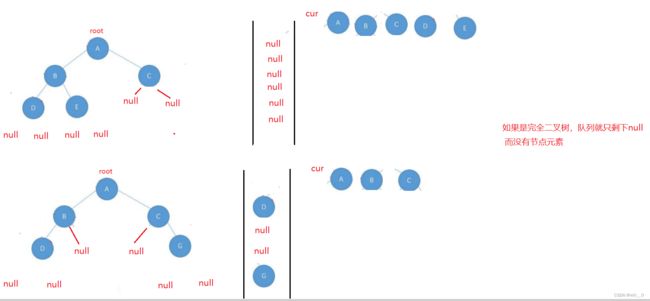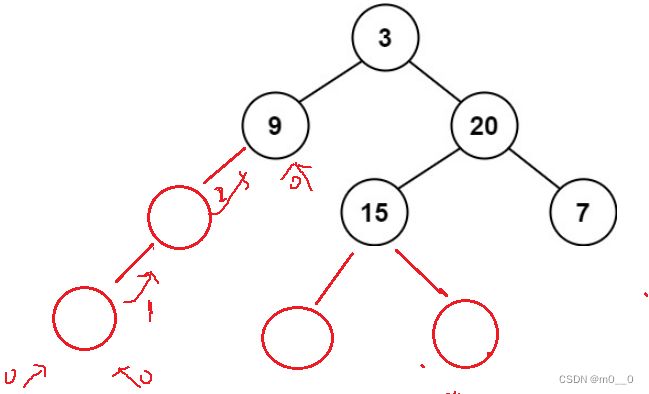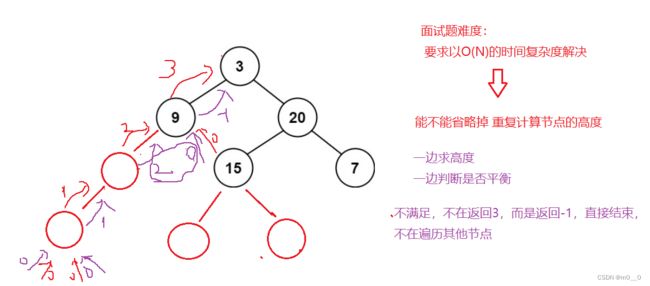实现二叉树的基本操作与OJ练习
![]()
目录
1.二叉树的基本操作
1.1二叉树基本操作完整代码
1.2检测value值是否存在
1.3层序遍历
1.4判断一棵树是不是完全二叉树
2.OJ练习
2.1平衡二叉树
2.2对称二叉树
2.3二叉树遍历
1.二叉树的基本操作
1.1二叉树基本操作完整代码
public class BinaryTree {
static class TreeNode{
public char val;
public TreeNode left;
public TreeNode right;
public TreeNode(char val) {
this.val = val;
}
}
//使用穷举,实现一棵树
public TreeNode creatTree() {
TreeNode A = new TreeNode('A');
TreeNode B = new TreeNode('B');
TreeNode C = new TreeNode('C');
TreeNode D = new TreeNode('D');
TreeNode E = new TreeNode('E');
TreeNode F = new TreeNode('F');
TreeNode G = new TreeNode('G');
TreeNode H = new TreeNode('H');
A.left = B;
A.right = C;
B.left = D;
B.right = E;
C.left = F;
C.right = G;
E.right = H;
return A;
}
// 前序遍历 根 左子树 右子树
public void preOrder(TreeNode root) {
if (root == null) {
return;
}
System.out.print(root.val + " ");
preOrder(root.left);
preOrder(root.right);
}
// 中序遍历 左 根 右
public void inOrder(TreeNode root) {
if (root == null) {
return;
}
inOrder(root.left);
System.out.print(root.val + " ");
inOrder(root.right);
}
// 后序遍历 左 右 根
public void postOrder(TreeNode root){
if (root == null) {
return;
}
inOrder(root.left);
inOrder(root.right);
System.out.print(root.val + " ");
}
// 获取树中节点的个数
public int sizeCount;
public void size(TreeNode root){
if(root == null) {
return;
}
sizeCount++;
size(root.left);
size((root.right));
}
//子问题
public int size2(TreeNode root) {
if (root == null) {
return 0;
}
return size2(root.left) + size2(root.right) + 1;
}
// 获取叶子节点的个数
public int leafCount;
//遍历求解
public void getLeafNodeCount(TreeNode root) {
if (root == null) {
return;
}
if (root.left == null && root.right == null){
leafCount++;
}
getLeafNodeCount(root.left);
getLeafNodeCount(root.right);
}
// 子问题思路-求叶子结点个数
public int getLeafNodeCount2(TreeNode root){
if (root == null) {
return 0;
}
if (root.left == null && root.right == null) {
return 1;
}
//左子树的叶子节点+右子树的叶子节点
return getLeafNodeCount2(root.left) +
getLeafNodeCount2(root.right);
}
// 获取第K层节点的个数
public int getKLevelNodeCount(TreeNode root,int k) {
if (root == null) {
return 0;
}
if (k == 1) {
return 1;
}
return getKLevelNodeCount(root.left,k-1) +
getKLevelNodeCount(root.right,k-1);
}
// 获取二叉树的高度
public int getHeight(TreeNode root) {
if (root == null) {
return 0;
}
int leftHeight = getHeight(root.left);
int rightHeight = getHeight(root.right);
return Math.max(leftHeight,rightHeight) + 1;
}
// 检测值为value的元素是否存在
public TreeNode find(TreeNode root, int val) {
if (root == null) {
return null;
}
if (root.val == val) {
return root;
}
TreeNode leftVal = find(root.left,val);
if (leftVal != null) {
return leftVal;
}
TreeNode rightVal =find(root.right,val);
if (rightVal != null) {
return rightVal;
}
//左、右子树都没有
return null;
}
//层序遍历
public void levelOrder(TreeNode root){
if (root == null) {
return;
}
Queue queue = new LinkedList<>();
queue.offer(root);
while (!queue.isEmpty()) {
TreeNode cur = queue.poll();
System.out.print(cur.val+" ");
if(cur.left != null) {
queue.offer(cur.left);
}
if (cur.right != null) {
queue.offer(cur.right);
}
}
}
//判断一棵树是不是完全二叉树
public boolean isCompleteTree(TreeNode root){
if(root == null) {
return true;
}
Queue queue = new LinkedList<>();
queue.offer(root);
while (!queue.isEmpty()) {
TreeNode cur = queue.poll();
if (cur != null) {
queue.offer(cur.left);
queue.offer(cur.right);
} else {
break;
}
}
//走到这里两种情况 1.队列为空 2.遇到break
while (!queue.isEmpty()) {
TreeNode cur = queue.peek();
if (cur != null) {
queue.poll();
} else {
return false;
}
}
return true;
}
} 1.2检测value值是否存在
1.3层序遍历
题解:
层序遍历:就是从上到下,从左到右,依次遍历。前序、中序、后序本质上都是从上到下。
所以,就是要解决从左到右。
可以引入队列解决(先进先出),如果不是空树,先把根节点放到队列里,此时队列不为空,当该节点出队是,用cur记录,不为空并把该节点的左、右节点放进队列。
1.4判断一棵树是不是完全二叉树
题解:
也是引入队列解决,当cur不为空把该节点的左、右节点放进队列;否则跳出循环。
在遍历队列,是否都为null.
2.OJ练习
2.1平衡二叉树
题解:
是不是一颗平衡二叉树,当前根节点的左右子树的高度差的绝对值<=1&&根左子树平衡&&根右子树平衡。
如下代码:就会发现求节点3的高度,把每个节点都求了一遍。 求节点9的高度时,也把每个节点都求了一遍。就会有很高度重复求,maxDepth有N个节点,最坏时间复杂度:N*N=N^2.
public boolean isBalanced(TreeNode root) {
if(root == null) {
return true;
}
int leftHeight = maxDepth(root.left);
int rightHeight = maxDepth(root.right);
return Math.abs(leftHeight - rightHeight) <= 1 &&
isBalanced(root.left)&&isBalanced(root.right);
}
public int maxDepth(TreeNode root) {
if (root == null) {
return 0;
}
int leftHeight = maxDepth(root.left);
int rightHeight = maxDepth(root.right);
return Math.max(leftHeight, rightHeight) + 1;
} public boolean isBalanced2(TreeNode root) {
if(root == null) {
return true;
}
return maxDepth(root) >= 0;
}
public int maxDepth2(TreeNode root) {
if (root == null) {
return 0;
}
int leftHeight = maxDepth2(root.left);
if(leftHeight < 0) {
return -1;
}
int rightHeight = maxDepth2(root.right);
if(leftHeight >= 0 && rightHeight >= 0
&& Math.abs(leftHeight - rightHeight) <= 1){
return Math.max(leftHeight,rightHeight) + 1;
} else {
return -1;
}
}2.2对称二叉树
题目描述:给你一个二叉树的根节点 root , 检查它是否轴对称。
题解:
public boolean isSymmetric(TreeNode root) {
if(root == null) {
return true;
}
return isSameTree2(root.left,root.right);
}
public boolean isSameTree2(TreeNode lefTree,TreeNode rightTree){
if(lefTree == null && rightTree != null || lefTree != null && rightTree == null) {
return false;
}
if(lefTree == null && rightTree == null) {
return true;
}
if(lefTree.val != rightTree.val) {
return false;
}
return isSameTree2(lefTree.left,rightTree.right)
&&isSameTree2(lefTree.right,rightTree.left);
}2.3二叉树遍历
题目描述:编一个程序,读入用户输入的一串先序遍历字符串,根据此字符串建立一个二叉树(以指针方式存储)。 例如如下的先序遍历字符串: ABC##DE#G##F### 其中“#”表示的是空格,空格字符代表空树。建立起此二叉树以后,再对二叉树进行中序遍历,输出遍历结果。
题解:
遍历这个字符串,根据前序遍历的方式,创建二叉树
class TreeNode {
char val;
TreeNode left;
TreeNode right;
public TreeNode(char val) {
this.val = val;
}
}
// 注意类名必须为 Main, 不要有任何 package xxx 信息
public class Main {
public static int i = 0;
public static void main(String[] args) {
Scanner in = new Scanner(System.in);
// 注意 hasNext 和 hasNextLine 的区别
while (in.hasNextLine()) { // 注意 while 处理多个 case
String str = in.nextLine();
TreeNode root = creatTree(str);
inOrder(root);
}
}
public static TreeNode creatTree(String str) {
//1.遍历字符串
//2.创建二叉树
TreeNode root = null;
if(str.charAt(i)!= '#') {
root = new TreeNode(str.charAt(i));
i++;
root.left = creatTree(str);
root.right = creatTree(str);
} else{
i++;
}
//返回根节点
return root;
}
public static void inOrder(TreeNode root) {
if(root == null) {
return;
}
inOrder(root.left);
System.out.print(root.val+" ");
inOrder(root.right);
}
}













